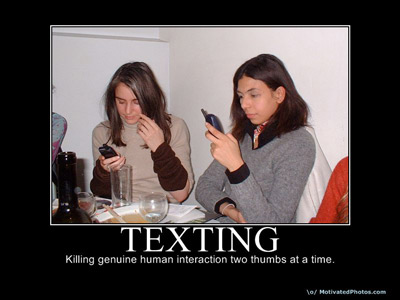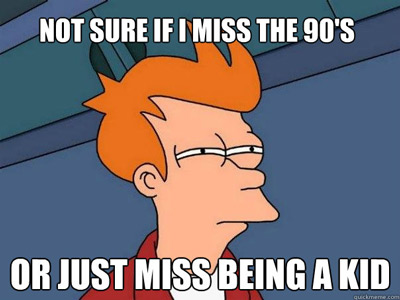The iPhone, every single friggin’ version, has taken us to a whole-nuther-level…technologically speaking. I heart my iPhone so much, in fact, that when I am physically too far removed from it (even if it’s off or on Airplane mode) I slowly start to develop a low-grade level of anxiety; the likes of which are generally reserved for visits to the gynecologist or confined areas full of men in suits with bad haircuts.
It’s not outright, noticeable anxiety that makes others uncomfortable or irritated while leaving me in shambles on the floor; it’s more like a slow, steady, internal burn that makes me illogical. This level of anxiety has me asking myself questions like: “Did I remember to put on clean underwear this morning?” When obviously I did not because I typically don’t wear any. This is something that would be blatantly apparent if my iPhone was within reach.
That being said, I have recently begun noticing the many ways in which the iPhone insidiously yet cleverly removes my common sense on a regular basis: whether it’s physically near or far. So much so, that I’ve made it one of my 2013 Resolutions to frequently ask myself: “What would pre-iPhone Rebekah do?” Rivaled only by the 1990s cultish “What would Jesus do?” movement (aka “WWJD”) that swept the Midwest then eventually the entire Evangelical Christian world, “WWPIRD” is an important personal movement that [I hope] will reverse the damage already done to my fledgling brain.
In no particular order, here are 5 outstanding ways the iPhone has made me (and possibly definitely you) a bit less smart than the average Joe:
1. Not Everything Wants to Be Touched

On a recent overseas flight to New Zealand, I spent at least 7.4 minutes pressing the buttons on my private mini-screen until I nearly broke my index finger. As I pressed, I cursed technology of any kind for how it never seems to work when you need it most. When one is staring straight down the barrel of a 12 hour flight over the Pacific ocean, the prospect of a non-working mini-screen that plays mostly terrible foreign films and old sitcoms no one watches anymore is enough to incite thoughts of murder-suicide.
Finally, the kind gentleman to my left, who for sake of illustrating just how stupid the iPhone has made me, was a geologist (unlike myself who clearly has a stronghold on technology since I work in tech and am around it basically every waking hour), kindly nudged me, pointed to the TV remote hidden in the arm rest and sweetly said: “I don’t think it’s a touch screen honey.”
2. Wait, Which Way is Walgreens?

I often, and by often I mean daily, find myself standing outside the exact location where I want to be with my head buried in Google Apple maps trying to find said location. This situation, when I really think about it, is akin to someone wearing their glasses asking: “where are my glasses?” Or my personal favorite, someone who is panic stricken because he or she has lost their keys when in fact they are holding them. Point being, I can be standing directly under a gigantic Walgreens sign, swearing at my map because it won’t load; which subsequently means I won’t be able to locate a Walgreens which sells my favorite brand of bamboo toilet paper. This is sheer lunacy.
3. I Can See You But I Won’t Talk to You

I’m not sure if this particular habit makes me stupid or just plain lazy, but it’s annoying nonetheless. The texting thing is really starting to get my goat. The thing is, actually speaking words is much less time consuming and potentially less nerve damaging than typing. Furthermore, the allusion of cool inherent in our texting universe is somewhat Jr. high-ish.
Sometimes I will ironically text a friend or one of my business partners who is standing five feet away and ask them a question that I could have easily asked outloud. That’s pretty funny in dork-land. But what makes us stupid is getting into habits that make us worse communicators in the long run and isolate us in ways we have yet to realize.
4. You Expect Me to Remember Numbers?

233-1461. 271-6161. 1500 SW Oakley. 5555. 598-7517. These are numbers I will remember as long as I have a working memory. Wanna know why? Because I had to remember them. They are my grandparents phone number, the place I grew up, my dad’s office number, the last four digits of my social (that one’s a decoy), and some other number which was important but I can’t specifically remember why.
Now I can’t remember any numbers from memory except my own phone number. This is a useless piece of information as I never give it out and don’t make a habit of calling myself. Two weeks ago I “lost” my iPhone in Chicago. I’m not gonna lie, I felt helpless.
5. I Think I Forgot How to Read

I’m accustomed to parsing through hundreds of pieces of information on my mobile device, mostly in the form of emails, industry articles, CIA briefings, and flash sale alerts on the daily. So, often times when I sit down to read a book or a magazine I feel like Jabba the Hut has eaten my brain then puked it back into my head. The words are all there, but my eyes skip around from word to word if the sentence is more than 140 characters (I have no clue where that comes from), and I have trouble reading sentences in order.
After twenty minutes of this eye-brain-word-battle, I finally remember how to read an entire paragraph, string them to other paragraphs, and enjoy a complete story (or at least chapter of a story).
This makes me feel smart. Finally.
